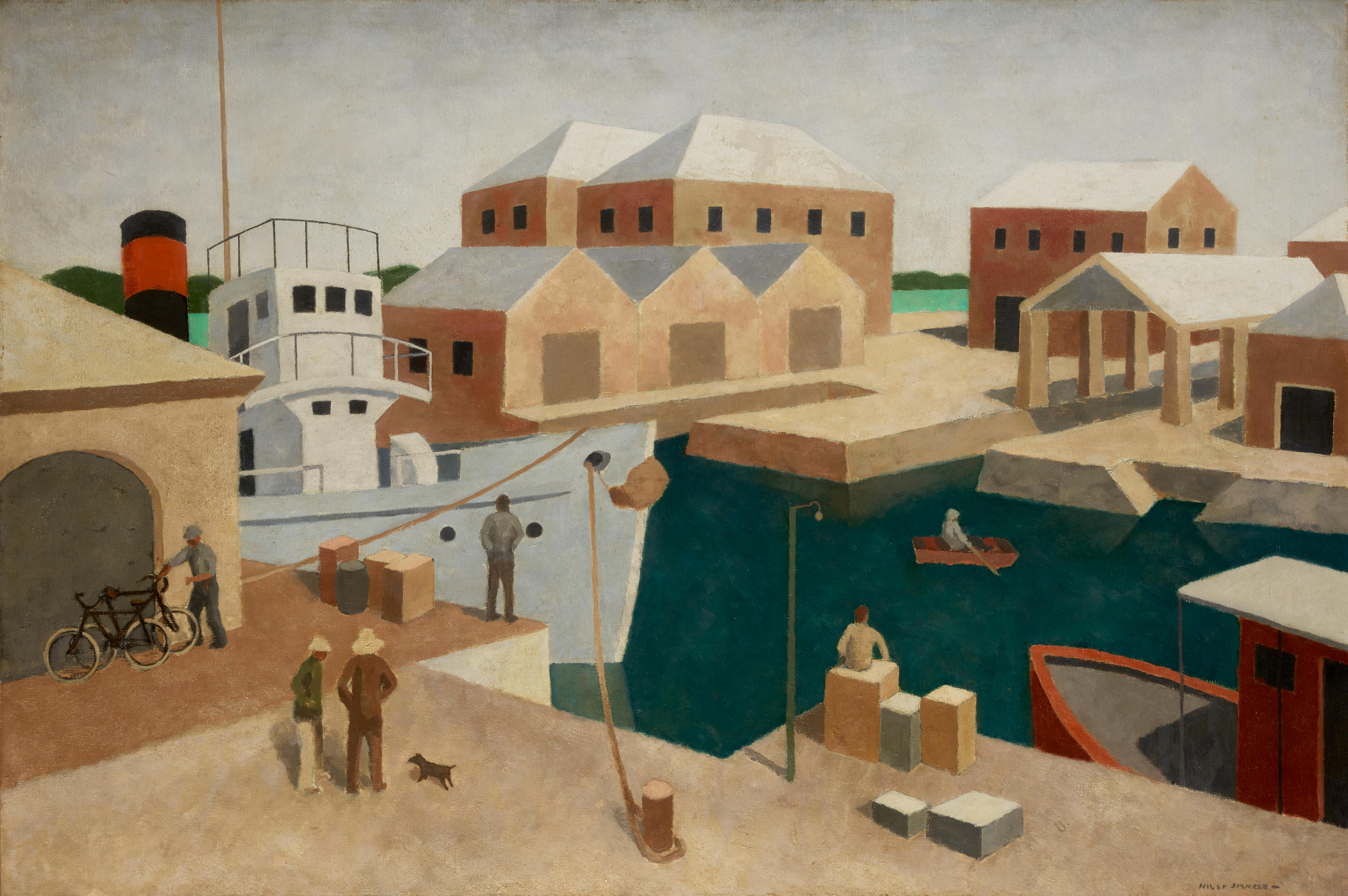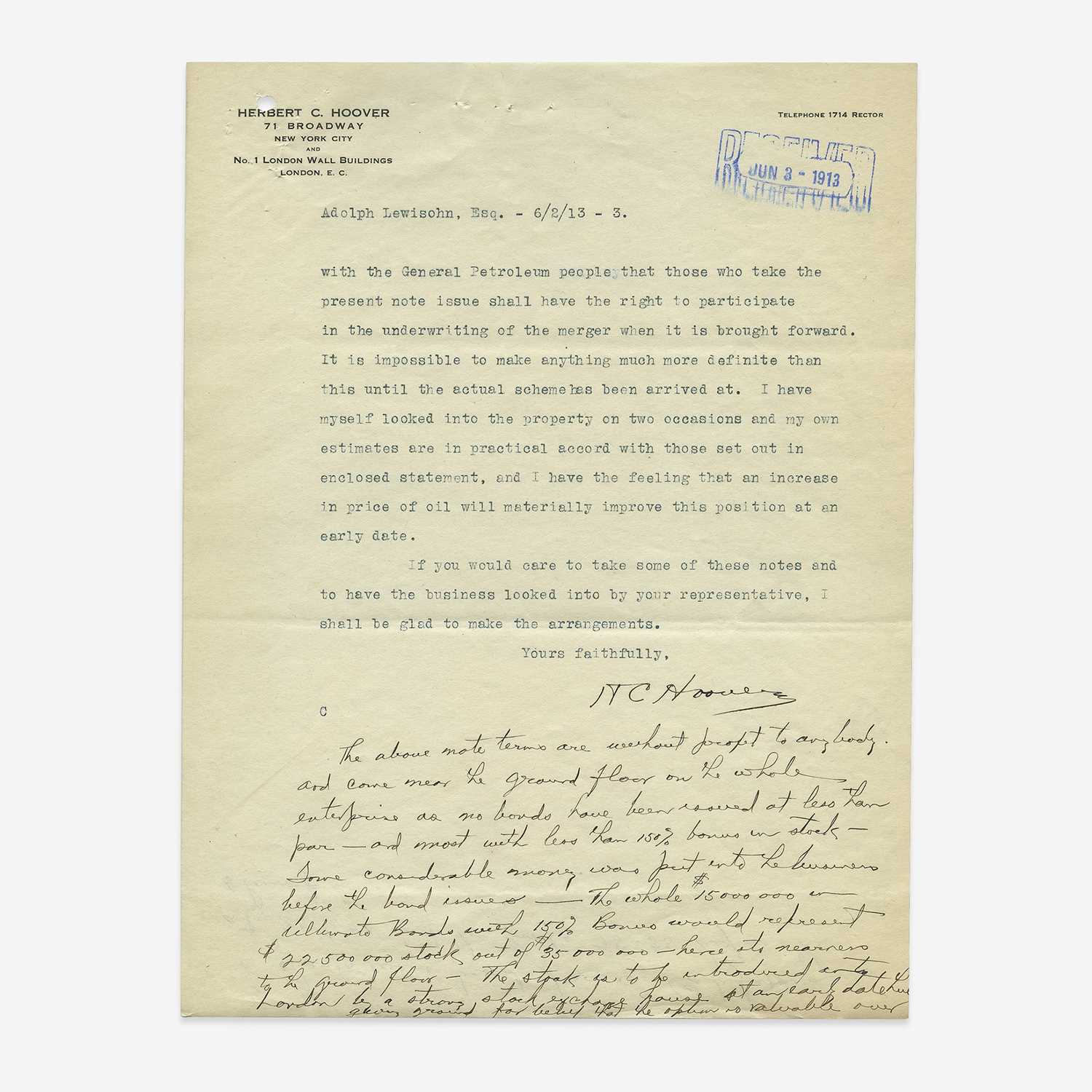Lot of 3 albums with letters enclosed. Letters from Presidents Taft and Coolidge, 1912-1928; Herbert Hoover and Alfred E. Smith 1928; Letters from John Galsworthy, 1921-1930 Lewisohn was a tireless correspondent and a frequenter of the rich and powerful. This collection of three bound volumes reflects two sides of his personality: his connections with U.S. presidents and his support for the arts. The first volume includes 31 letters from Presidents William Howard Taft and Calvin Coolidge, including one letter from Taft as president, one after his presidency, and one written as Justice on the U.S. Supreme Court. The rest, from Coolidge, include 25 as president, one telegram, and two ANsS on card with Presidential seal. Most of the letters are brief, friendly, and personal, through there are a few that make reference to politically significant issues. Perhaps the most significant is a fine letter from the thrifty New Englander Coolidge, Oct. 23, 1923, discussing what amounts to a philosophy of popular economics: The American people, taken as a whole, have been very quick to grasp the benefits that result from thrift and industry, and the cultivation of a saving disposition. They have not only deposited money in banks, but invested it in all kinds of business enterprises. Those who have started in this direction have always found that real satisfaction arises, not from indulgence, but from achievement. Those who save regularly find an increasing power, not only of finances, but of character. It is through the use of such power, for wise and just ends, that we can better our whole industrial and commercial establishment. It is not too much to say that the growth of America, as we know it, has been the result of these agencies. It has been, not only the vision and the high purpose of our forefathers, but, likewise, their work and their savings, which have created our country, and on the continuation of which the whole future and welfare of our people rests. The habit of saving is a constructive virtue... The second volume consists of congratulatory letters sent to Lewisohn on the occasion of his 79th birthday in 1928 by Herbert Hoover (on Dept. of Commerce letterhead) and Alfred E. Smith (on letterhead as Governor of New York). The final volume is a treasure trove of five ALsS, all by Galsworthy. While four of these are brief, the first (July 17, 1921) is a fine literary letter in which Galsworthy asks Lewisohnfor support for “the best poetic drama in the English language since Shakespeare -- James Elroy Flecker’s Hassan.” A rising literary talent who died tragically in 1915 at barely 30, Flecker was author of two significant plays, Hassan being the best known. Galsworthy explains that his only interest in promoting Hassan is “purely that of a literary man who wishes to see so really fine a drama given a proper chance,” and adding that the production was delayed due to high costs when Flecker succumbed. A great patron of the arts and progressive causes in New York City, Adolph Lewisohn (1849-1938) was one of those rare individuals who became fabulously wealthy, then stepped away to use his money for public good. Born into a Jewish family in Hamburg, Germany, Lewisohn immigrated to New York at the age of 16 to assist in the family mercantile business. Energetic and entrepreneurial, he made a fortune, branching out into investment banking and most famously, he began to invest in the extractive industries, becoming one of the nation’s most renowned Copper Kings. By the 1890s, Lewisohn’s fortunes had grown so immense that he decided he had enough for a lifetime, and stepped away to devote himself to support a wide variety of philanthropic causes. A collector of paintings by members of the Barbizon School and Impressionists, he helped seed the painting collections at the Brooklyn Museum of Art, and he was a major supporter of the Metropolitan Opera, education, and a host of progressive and Progressive-era social causes. Late in life, h
Lot of 3 albums with letters enclosed. Letters from Presidents Taft and Coolidge, 1912-1928; Herbert Hoover and Alfred E. Smith 1928; Letters from John Galsworthy, 1921-1930 Lewisohn was a tireless correspondent and a frequenter of the rich and powerful. This collection of three bound volumes reflects two sides of his personality: his connections with U.S. presidents and his support for the arts. The first volume includes 31 letters from Presidents William Howard Taft and Calvin Coolidge, including one letter from Taft as president, one after his presidency, and one written as Justice on the U.S. Supreme Court. The rest, from Coolidge, include 25 as president, one telegram, and two ANsS on card with Presidential seal. Most of the letters are brief, friendly, and personal, through there are a few that make reference to politically significant issues. Perhaps the most significant is a fine letter from the thrifty New Englander Coolidge, Oct. 23, 1923, discussing what amounts to a philosophy of popular economics: The American people, taken as a whole, have been very quick to grasp the benefits that result from thrift and industry, and the cultivation of a saving disposition. They have not only deposited money in banks, but invested it in all kinds of business enterprises. Those who have started in this direction have always found that real satisfaction arises, not from indulgence, but from achievement. Those who save regularly find an increasing power, not only of finances, but of character. It is through the use of such power, for wise and just ends, that we can better our whole industrial and commercial establishment. It is not too much to say that the growth of America, as we know it, has been the result of these agencies. It has been, not only the vision and the high purpose of our forefathers, but, likewise, their work and their savings, which have created our country, and on the continuation of which the whole future and welfare of our people rests. The habit of saving is a constructive virtue... The second volume consists of congratulatory letters sent to Lewisohn on the occasion of his 79th birthday in 1928 by Herbert Hoover (on Dept. of Commerce letterhead) and Alfred E. Smith (on letterhead as Governor of New York). The final volume is a treasure trove of five ALsS, all by Galsworthy. While four of these are brief, the first (July 17, 1921) is a fine literary letter in which Galsworthy asks Lewisohnfor support for “the best poetic drama in the English language since Shakespeare -- James Elroy Flecker’s Hassan.” A rising literary talent who died tragically in 1915 at barely 30, Flecker was author of two significant plays, Hassan being the best known. Galsworthy explains that his only interest in promoting Hassan is “purely that of a literary man who wishes to see so really fine a drama given a proper chance,” and adding that the production was delayed due to high costs when Flecker succumbed. A great patron of the arts and progressive causes in New York City, Adolph Lewisohn (1849-1938) was one of those rare individuals who became fabulously wealthy, then stepped away to use his money for public good. Born into a Jewish family in Hamburg, Germany, Lewisohn immigrated to New York at the age of 16 to assist in the family mercantile business. Energetic and entrepreneurial, he made a fortune, branching out into investment banking and most famously, he began to invest in the extractive industries, becoming one of the nation’s most renowned Copper Kings. By the 1890s, Lewisohn’s fortunes had grown so immense that he decided he had enough for a lifetime, and stepped away to devote himself to support a wide variety of philanthropic causes. A collector of paintings by members of the Barbizon School and Impressionists, he helped seed the painting collections at the Brooklyn Museum of Art, and he was a major supporter of the Metropolitan Opera, education, and a host of progressive and Progressive-era social causes. Late in life, h


.jpg)
.jpg)
.jpg)
.jpg?w=400?width=1600&quality=70)









Testen Sie LotSearch und seine Premium-Features 7 Tage - ohne Kosten!
Lassen Sie sich automatisch über neue Objekte in kommenden Auktionen benachrichtigen.
Suchauftrag anlegen